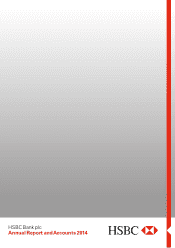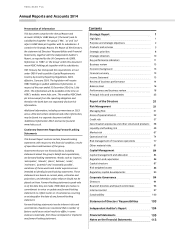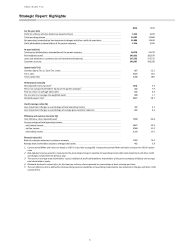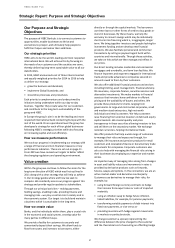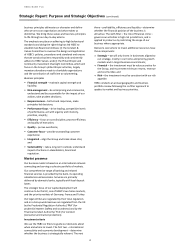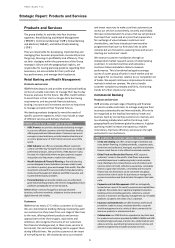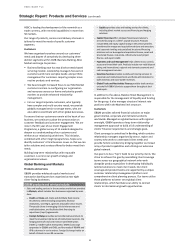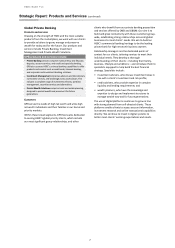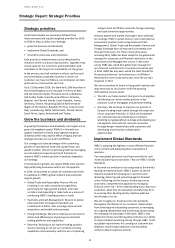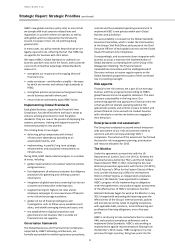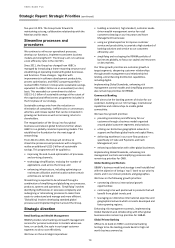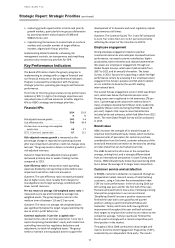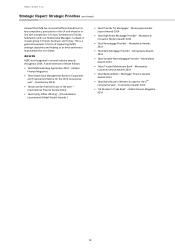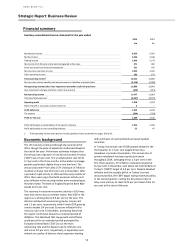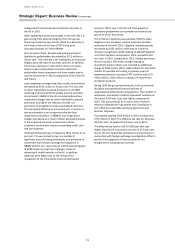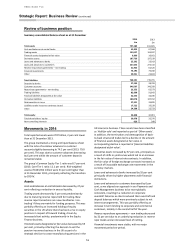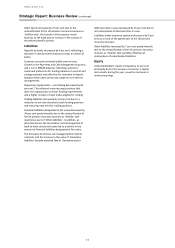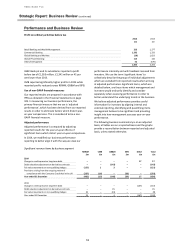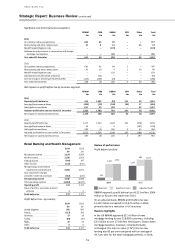HSBC 2014 Annual Report Download - page 11
Download and view the complete annual report
Please find page 11 of the 2014 HSBC annual report below. You can navigate through the pages in the report by either clicking on the pages listed below, or by using the keyword search tool below to find specific information within the annual report.
HSBC BANK PLC
Strategic Report: Strategic Priorities (continued)
9
HSBC’s new global sanctions policy aims to ensure that
we comply with local sanctions related laws and
regulations in countries where we operate, as well as
with global sanctions imposed by the UN Security
Council, European Union, US, UK and Hong Kong
governments.
In many cases, our policy extends beyond what we are
legally required to do, reflecting the fact that HSBC has
no appetite for business with illicit actors.
We expect HSBC’s Global Standards to underpin our
business practices now and in the future, and to provide
a source of competitive advantage. Global Standards
allow us to:
• strengthen our response to the ongoing threat of
financial crime;
• make consistent – and therefore simplify – the ways
by which we monitor and enforce high standards at
HSBC;
• strengthen policies and processes that govern how
we do business and with whom; and
• ensure that we consistently apply HSBC Values.
Implementing Global Standards
Each global business, supported by Financial Crime
Compliance, has identified where and how it needs to
enhance existing procedures to meet the global
standards. They are now in the process of deploying the
systems, processes, training and support to put the
enhanced procedures into practice.
This is being done in two stages:
• delivering policy components with limited
infrastructure dependency according to an
accelerated timeline; and
• implementing, in parallel, long term strategic
enhancements and associated enhancements to
infrastructure.
During 2014, HSBC made material progress in a number
of areas, including:
• global implementation of customer selection policies
and governance;
• first deployment of enhanced customer due diligence
procedures for gathering and verifying customer
information;
• integration of global sanctions screening lists into our
customer and transaction screening tools;
• targeted training for highest risk roles and all-
employee campaigns to raise awareness of financial
crime risk and encourage escalation;
• global roll out of financial intelligence and
investigations units to follow up on escalations and
alerts, and identify emerging trends and issues; and
• the establishment of global procedures and
governance to exit business that is outside our
financial crime risk appetite.
Governance framework
The Global Businesses and Financial Crime Compliance,
supported by HSBC Technology and Services, are
formally accountable for delivering business procedures,
controls and the associated operating environment to
implement HSBC’s new policies within each Global
Business and jurisdiction.
This accountability is overseen by the Global Standards
Execution Committee, which is under the chairmanship
of the Group Chief Risk Officer and consists of the Chief
Executive Officers of each global business and the Global
Head of Financial Crime Compliance.
Correspondingly, and to promote closer integration with
business as usual, a report on the implementation of
Global Standards is a standing item at the Group’s Risk
Management Meeting. The Financial System
Vulnerabilities Committee and the Holdings Board of
Directors continue to receive regular reports on the
Global Standards programme as part of their continued
role in providing oversight.
Risk appetite
Financial crime risk controls are a part of our everyday
business and they are governed according to HSBC’s
global financial crime risk appetite statement. This aims
to ensure sustainability in the long-term. Our
overarching appetite and approach to financial crime risk
is that we will not tolerate operating without the
appropriate systems and controls in place to detect and
prevent financial crime and will not conduct business
with individuals or entities we believe are engaged in
illicit behaviour.
Enterprise-wide risk assessment
The Group has conducted its second annual enterprise-
wide assessment of our risks and controls related to
sanctions and anti-money laundering (‘AML’)
compliance. The outcome of this assessment has formed
the basis for risk management planning, prioritisation
and resource allocation for 2015.
The Monitor
Under the agreements entered into with the US
Department of Justice (‘DoJ’), the UK FCA, formerly the
Financial Services Authority (‘FSA’), and the US Federal
Reserve Board (‘FRB’) in 2012, including the five-year
deferred prosecution agreement with the DoJ (‘US DPA’),
the US Attorney’s Office for the Eastern District of New
York, and the US Attorney’s Office for the Northern
District of West Virginia, an independent compliance
monitor (‘the Monitor’) was appointed to evaluate
HSBC’s progress in fully implementing its obligations
under the agreements, and produce regular assessments
of the effectiveness of HSBC’s Compliance function.
Michael Cherkasky began his work as the Monitor in July
2013 charged with evaluating and reporting upon the
effectiveness of the Group’s internal controls, policies
and procedures as they relate to ongoing compliance
with applicable AML, sanctions, terrorist financing and
proliferation financing obligations, over a five-year
period.
HSBC is continuing to take concerted action to remedy
AML and sanctions compliance deficiencies and to
implement Global Standards. HSBC is also working to
implement the agreed recommendations flowing from
the Monitor’s 2013 review. HSBC recognises it is only
part way through a journey, being two years into the

